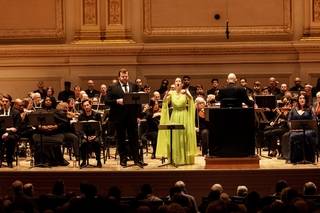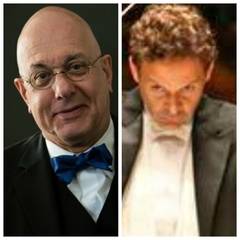|
Back
Ovid’s Tree-Hugger on Wings of Song New York
Isaac Stern Auditorium, Carnegie Hall
03/23/2023 -
Richard Strauss: An den Baum Daphne, AV 137 – Daphne, Op. 82
Jana McIntyre (Daphne), Kyle van Schoonhoven (Apollo), Aaron Blake (Leukippos), Ronnita Miller (Gaea), Stefan Egerstrom (Peneios), Marlen Nahhas, Ashley Dixon (Maidens), Kenneth Overton, Jack Cotterell, Paul Holmes, Blake Austen Brooks (Shepherds)
Bard Festival Chorale, James Bagwell (Music Director); American Symphony Orchestra, Leon Botstein (Music Director, Conductor)

K. Van Schoonhoven, J. McIntyre, L. Botstein (© Matthew Dyne)
“‘My bride,’ he said, ‘since you can never be, at least, sweet laurel, you shall be my tree. My lure, my locks, my quiver you shall wreathe.’ Thus spoke the god; the laurel in assent inclined her new‑made branches and bent down, or seemed to bend, her head, her leafy crown.”
Ovid, Metamorphoses
“Daphne becomes that universal living symbol of nature, its beauty and the synthesis of the Apollonian and the Dionysian: a tree.”
Leon Botstein, from Program Notes
Once again, the indefatigable Leon Botstein has uncovered a very rare operatic jewel. And while Richard Strauss’ Daphne is hardly unknown, its 75‑minute duration and strange Ovid‑inspired story makes it unsuitable for most opera halls.
Yet so breathtaking is some of the music, and so visual the stage directions, obviously Daphne deserves wider recognition. Last night’s production was purely a concert adaptation. Thus, the lighting changes, the murder, the appearance of shepherds and maidens hardly reached the peaks of the original opera.
Mr. Botstein’s cast, though, had some splendid voices. And if the duet and trio lacked the punch of visual power, the notes almost sufficed.
Strauss was always entranced by ancient myths, and Daphne fit his love ideally. We have here in ancient Greece a girl who loves nature more than her one‑time playmate Leukippos. On an orgiastic feast day, Leukippos thinks he can win her over. But the god Apollo (invited to come by her father) falls in love with Daphne, kills her childhood chum, and then, in apology and regrets, has Daphne live immortally by transforming her into a laurel tree.
(Apollo was quite broadminded in his arboreal transfigurations. Infatuated infatuation with the beautiful boy Cyparrisus, he transformed the kid into another tree, this one with “tears”–or sap–running down its trunk. Yep, that’s our Cypress Tree.)
After many a change in the libretto, Strauss was inspired to write orchestral “nature” music as glorious as anything he ever wrote. The opening notes–a mere rising fourth in the winds–became the signature motive for both orchestra and voice. His pictorial thunder and lightning and fighting were typically pictured by spectacular notes. Unmistakably last night, one heard brassy‑windy musings of Heldenleben, Don Juan, even Alpine Symphony. And in his final orchestral “tree” music, he does away with Daphne’s voice at all, leaving it to the orchestra to give reflections of tree‑trunk, tree‑leaves, tree‑branches, before Daphne’s wordless sounds.
In a way, then, Daphne was partly an extended tone‑poem. It was also partly a chamber opera, Gluck style–though his chamber orchestra was a typical Strauss orchestra of Brobdingnagian forces. (Strauss’s idol was Mozart, but he couldn’t resist adding two harps, some bass drums, lots of horns and trumpets.)
Equally, Strauss couldn’t resist writing for high soprano voices. Daphne, in fact, in something less than a full opera duration, has high arias which make Rosenkavalier’s Sophie sound like Boris Godunov. Last night, Jana McIntyre started her exquisitely luscious “Oh stay beautiful day” almost entirely above a high G. Her penultimate pre‑tree aria “Sorrow-stricken Daphne!!’ was like a monodrama with equally high soprano measures.
How did Ms. McIntyre handle it? In one way, she was finer even than Ms. Fleming’s YouTube performance. Renée Fleming easily reached those engaging climaxes. But hers was an experienced opera diva. Ms. McIntyre was Strauss’s young heroine. Her voice on the heights was so startlingly good that one almost relaxed as she came down an octave. Yet it was her youthful personality, her virginal simplicity which was so simple, gentle, even in the most passionate moments.
Add to that a cast dressed almost entirely in black (save for the two sapphire-blue Maidens) and her emerald-green gown was a joy to behold.
Equal plaudits for Kyle van Schoonhoven as the god Apollo. The music calls for a Wagnerian heldentenor, yet with a voice changing personality. First as the god disguised, voice crackling. Then evolving into the lover, the impassioned, the killer, the repentant. Mr. Van Schoonhoven was powerful when necessary, but also dramatically fungible.
The most impressive voice, though, was bass Stefan Egerstrom. Vocally powerful, perhaps static in personality but always impressive. As Daphne’s boyhood chum, Aaron Blake was a suitable rival for god Apollo. Hardly with that Wagnerian tenor voice, but that of a poor suitor, a shepherd with a simple Mozartiean tenor voice.
I cannot remember any Strauss opera with two leading tenors. But here the sexual Van Schoonhoven was the rival to the purity of Mr. Blake. Of the others, Ronnita Miller was fine as Daphne’s mother, but hardly changing her mezzo. The two Maidens, Marlen Nahhas and Ashley Dixon, had charming duets, worthy of any Strauss–or Mozart–opera.

L. Botstein/J. Bagwell (© Bard College)
Mr. Botstein, as always, provided good workmanlike conducting. At times, American Symphony Orchestra overbalanced the voices. But Richard Strauss’ orchestration had such color, such intertwining of dramatic and pastoral, that was excusable. James Bagwell had trained his all-male shepherd chorus with vocal power.
Alas, the first 15 minutes of the evening were undramatically unimpressive. Richard Strauss had written a complicated epilogue for children’s chorus, instead of the tree‑solo. That was wisely omitted. Mr. Botstein started the evening with this long‑ish chorale, which in vision and sound was a lesson in pure monotony.
For a “bucolic tragedy”, an abbreviated (say, two‑dozen) vernal voices might have been charming. Instead, he brought on 65‑odd mixed mature voices, all of them dressed in soot‑blackness. They had to essay a most complicated score, highlighted only by the initial woodwind sounds of the opera itself.
Yes, that was a cheerless lugubrious opening. After the intermission came Daphne itself. The illuminations and shadows of gods and humans became as transformative as the legendary laurel tree itself.
Harry Rolnick
|